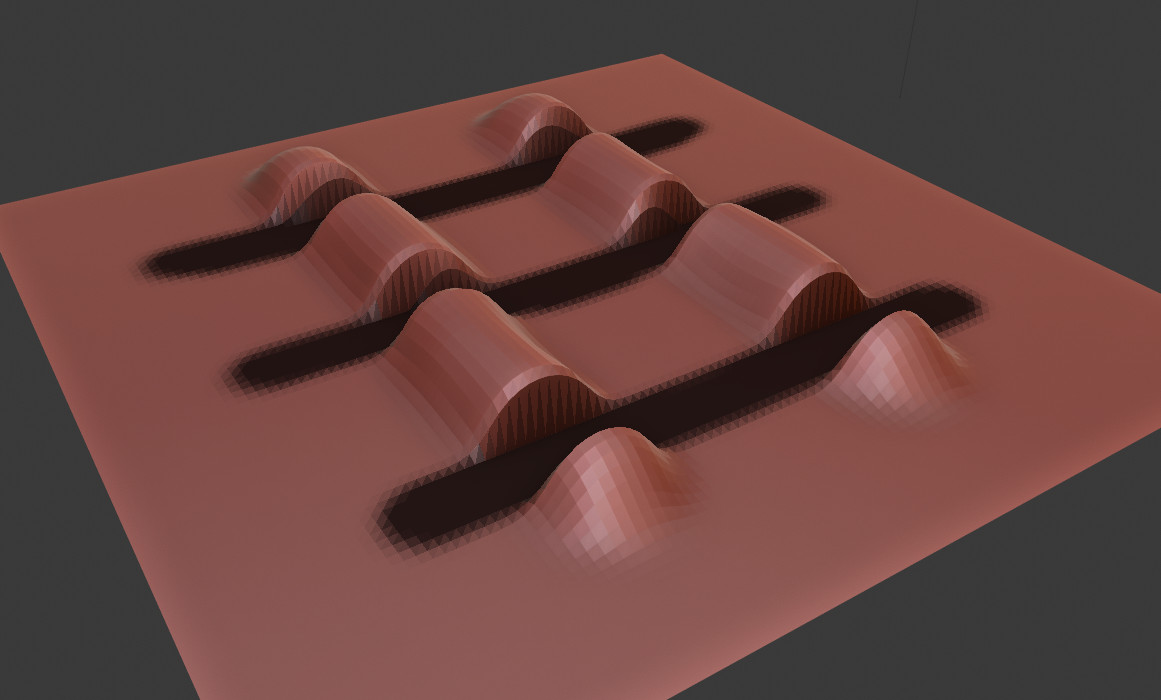Hiding & Masking¶
Reference
- Mode
Sculpt Mode
- Menu
While sculpting, areas might be hidden behind parts of the mesh or they might be too close to other parts. To work through these, it is useful to isolate parts of a mesh to sculpt on. This can be done by either completely hiding parts of the mesh or by masking areas that can not be sculpted on.
Hide¶
Portions of the mesh can be hidden in Sculpt Mode to improve the viewport performance and to access parts of the mesh that would otherwise be difficult to access, because they are occluded by other parts.
The hidden faces cannot be sculpted on. Hiding is shared between Edit Mode and Sculpt Mode (i.e. hiding/unhiding in one mode affects the other mode too).
- Show All Alt-H
Reveal all hidden parts.
- Show Bounding Box Shift-H
To reveal a hidden part of a mesh inside the selection.
- Hide Bounding Box H
To hide a part of a mesh inside the selection. This works similar to the Box Select tool.
- Hide Masked
Hides all masked vertices.
Mask¶
Masking to control which areas of the mesh are influenced by sculpting.

Black part is masked.¶
Brush¶
To edit the mask, select the Mask Brush from the Brush panel.
Editing¶
Masks can be edited across the entire model. Using A opens a pie menu to choose different operations.
- Invert Mask Ctrl-I
Inverts an existing mask.
- Fill Mask
Fills the whole mask with a value of 1.
- Clear Mask Alt-M
Fills the mask with a value of 0. To completely remove the mask data see Clearing Mask Data.
- Box Mask B
Works like the Box Select tool, it creates a rectangular mask region. Hold Shift to clear the mask of the selected region.
- Lasso Mask Shift-Ctrl-LMB
Can be used to create a free-form mask, similar to the Lasso Select tool.
Tipp
To clear the mask of areas with the Lasso Mask tool, first invert the mask, apply the Lasso Mask, and then invert the mask back.
- Mask Filters
Mask filters are operations that are applied to the whole paint mask.
- Type
- Smooth/Sharpen Mask
Changes the crispness of the mask edge.
- Grow/Shrink Mask
Changes the size of the mask.
- Increase/Decrease Contrast
Changes the contrast of the mask.
- Iterations
The number of times that the filter is going to be applied.
- Auto Iteration Count
Use a automatic number of iterations based on the number of vertices of the sculpt.
- Expand Mask by Topology Shift-A
Creates a mask radiating outwards from the active vertex in a uniform manner.
- Expand Mask by Curvature Shift-Alt-A
Creates a mask radiating outwards from the active vertex while following the curvature of the mesh.
- Mask Extract
Creates a duplicate mesh object based on masked geometry.
- Threshold
Minimum mask value to consider the vertex valid to extract a face from the original mesh.
- Add Boundary Loop
Creates and extra boundary loop on the edges of the geometry, making it ready for adding a Subdivision Surface modifier later.
- Smooth Iterations
Smooth iterations applied to the extracted mesh.
- Project to Sculpt
Project the extracted mesh on to the original sculpt object.
- Extract as Solid
Adds a Solidify Modifier to the newly created mesh object.
- Mask Slice
Removes the masked vertices from the mesh.
- Threshold
Minimum mask value to consider the vertex valid to extract a face from the original mesh
- Fill Holes
Fills concave holes with geometry that might have resulted from the Mask Slice operation.
- Slice to New Object
Create a new object from the masked geometry.
- Dirty Mask
Generates a mask based on the geometry cavity and pointiness.
Displaying¶
Reference
- Mode
Sculpt Mode
- Popover
The mask display can be toggled as a viewport overlay. In the overlay popover, the opacity of the mask overlay can be adjusted to make it more or less visible on the mesh.
Clearing Mask Data¶
Reference
- Mode
Object/Edit Mode
- Menu
Completely frees the mask data layer from the mesh, while not a huge benefit, this can speed-up sculpting if the mask is no longer being used.